Description
ABSTRACT
Judicial Attitude to Service of Originating Court Process on a Company by Substituted Means: Imperative for Revisitation
Matthew Izuchukwu Anushiem*
ABSTRACT
Service of court processes, particularly originating processes, confers jurisdiction on courts to adjudicate on a case and also bring to the defendant’s notice of a claim against him to enable the defendant to either defend or admit the claim. Originating processes are usually served personally or through substituted means. However, in cases where a defendant is a company, the courts frown at the service of originating court process on it by substituted means. The Courts have held in a plethora of cases that it is a legal aberration to serve originating court processes on a company by substituted means. The ratio behind the courts’ decisions is that a company is usually stationary at the registered corporate address. A process server can always go to the company and serve the originating processes in accordance with the Rules to wit: service on the company’s principal officers. It is now apparent, owing to the current events and happenings, that some companies only exist in the cupboard of their shareholders and directors without any physical presence. Some companies are also registered with an existing address. Still, they operate virtually without any physical presence in line with the prevalent e-commerce and digital economic activities in the world, thereby making it challenging to abide by the Courts’
position. This article aims to determine whether the courts’ position is still in tandem with the extant rules and the prevalent technological advancement leading to the operation of virtual economic activities in Nigeria. The research methodology employed is doctrinal, while data sources are statutes, case law, Textbooks, Journal articles and Internet materials. The researcher found that the extant Rules and prevalent virtual operation of economic activities make it imperative to serve the court process on a company by substituted means where it appears to the court that personal service cannot be promptly and conveniently effected. This article made a case for a revisitation of the judicial attitude to service of court processes on a company by substituted means through the company’s email address filed in incorporation documents; social media pages; delivery by courier services to the address of the company filed on the incorporation documents, posting on the entrance of the company’s registered address, posting same at the entrance gate of the address of any director or the secretary of the company as provided in the incorporation documents and service through any agent of the company.
Keywords: Company, originating processes, Service of court processes, substituted service
INTRODUCTION
A Court process is any means used by the court to acquire or exercise its jurisdiction over a person or specific property. It is a means whereby the court compels the appearance of the defendant before it or complies with its demands.1 A Court process can either be an originating process or other subsequent processes in a suit. An originating process is the one that initiates a suit; it is the process whereby a litigant who has a claim against another or others presents his grievances before a court or tribunal for redress. The originating process confers jurisdiction on the court to entertain an action. In civil proceedings at the High Courts in Nigeria, there are four originating processes with which an action can be commenced in court. They are Writ of Summons, Originating Summons, Originating Motions and Petitions. The appropriate type of originating process to be employed while commencing an action depends on the nature of the dispute and the facts of the claim. Aside from the originating processes, other court processes may be required to be filed in the course of the action, including motions, written addresses, and so on.
Irrespective of the type of originating process used in commencing an action, it is imperative that the defendant should be served with the originating processes. It is also imperative that subsequent processes in the suit should be served on the adverse parties; these subsequent processes, if a legal practitioner represents the adverse party, they can be served on the legal practitioner. Service of originating processes according to the various Rules of Court is done primarily by personal service while in cases where personal service is not practicable, the court may order that the processes be served on the defendant by substituted means.2 The essence of service of processes, whether by personal or by substituted means, is for the defendant to be aware of the case against him and if he has a defence, to put forward his defence to the case. The need for service of both originating and accompanying court processes is anchored on the principle of fair hearing as enshrined in the Constitution.3 Concerning companies, which are artificial persons, they do not possess physical bodies that can be served with court processes. A company only acts through its primary and secondary organs, which are the company’s minds, wills, legs and hands. A company’s minds and wills are the shareholders, directors, managing directors and managers, the primary organs of the company, while the secondary organs, the other officers of the company, are the hands, legs and eyes of the company. It is on these Primary organs of a company that originating court processes against the company can be served on behalf of the company. The Companies and Allied Matters Act4 provides that court processes should be served on companies in the manner provided by the Rules of the particular court wherein the suit is pending. The problem arises when the mode of service on companies as stipulated by the various rules of court cannot be promptly and conveniently effected on a defendant company making the aggrieved party go home without his grievances being addressed because the Rules of Court forbids any other mode of service on the company asides the mode stipulated by the Rules of Court.
*LL. B (Hons), BL, LL.M, PhD. Lecturer 1, Faculty of Law, Nnamdi Azikiwe University, Nigeria. Tel: 08032641757, email:
mi*********@un****.ng
.
- V Ifeachor, ‘Service & Communication of Court Processes & Documents Practice & Procedure’ Paper presented at NJI Workshop on 9 September 2019.
- See or 6 rl 2 of Federal High Court (Civil Procedures) Rules 2019, or 7 rl 2 of High Court of Anambra State (Civil Procedure) Rules 2006 now or 8 rl 2 of High Court of Anambra State (Civil Procedure) Rules 2019, or 7 rl 2 of High Court (Civil Procedures) of Enugu State Rules 2006 now or 7 rl 2 of High Court (Civil Procedures) of Enugu State Rules 2020, or 5 rl 2 of Fundamental Rights (Enforcement Procedures) Rules, 2009.
- Constitution of the Federal Republic of Nigeria 1999 (as amended), s 36.
- See CAMA2020, s 89; Trenco (Nigeria) Ltd v African Real Estate Ltd [1978] 4 SC 9.

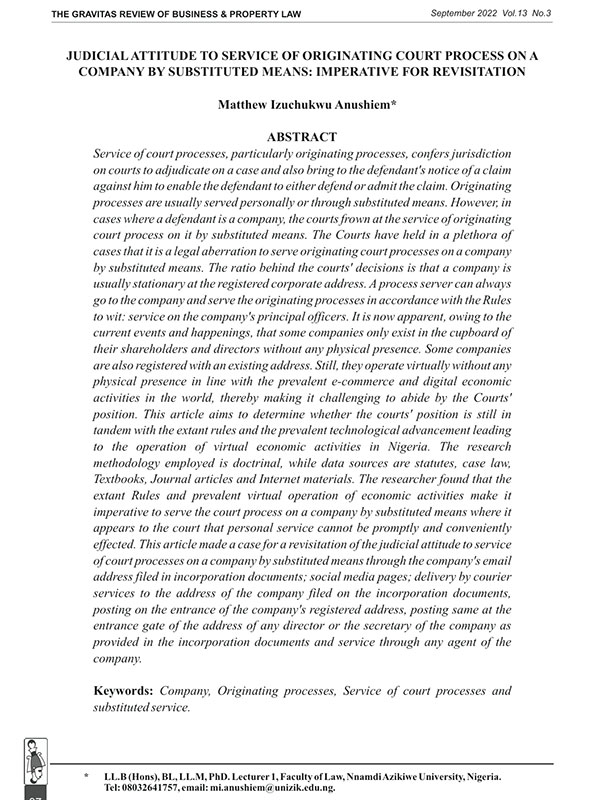
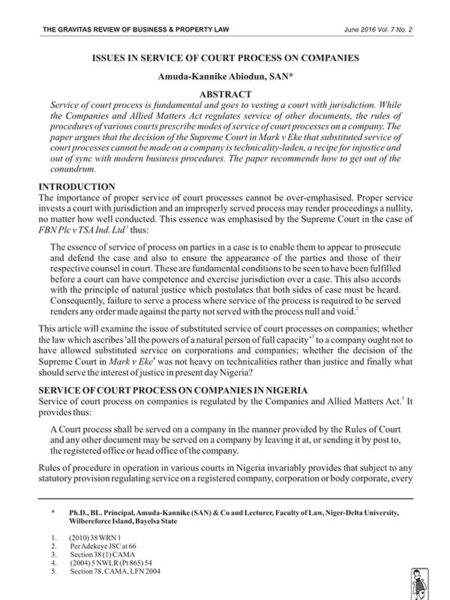
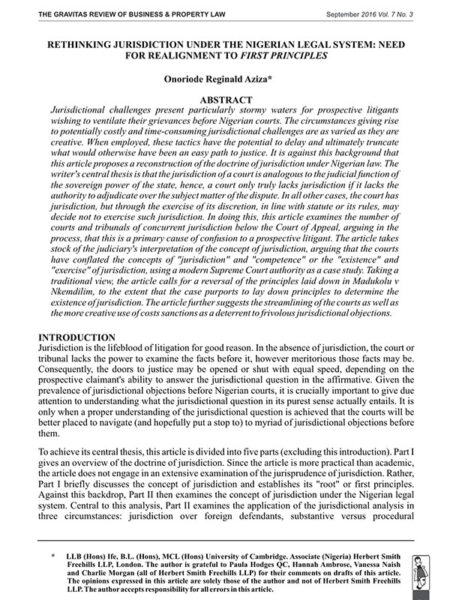
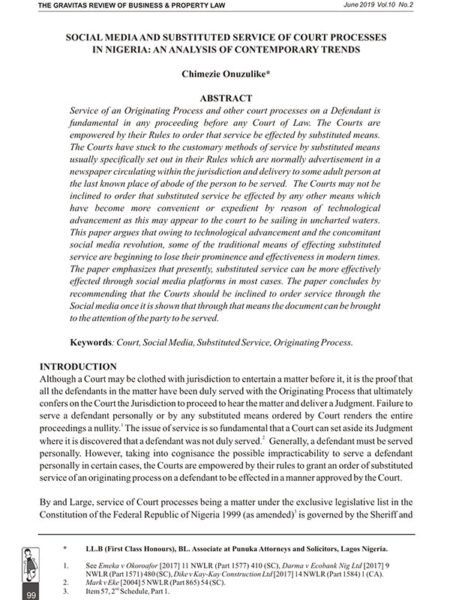
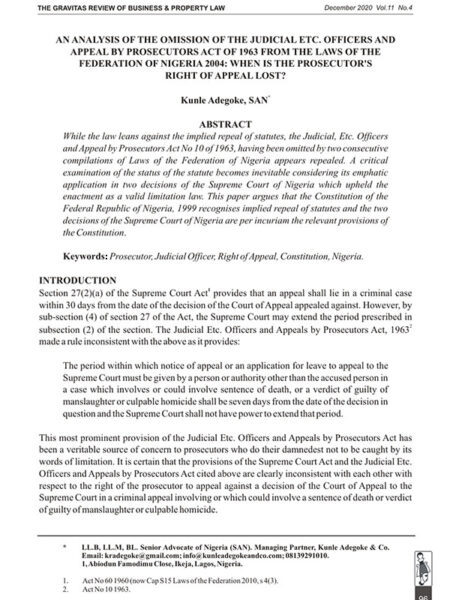


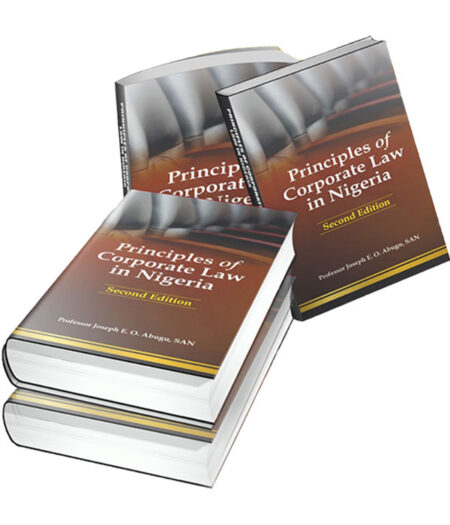
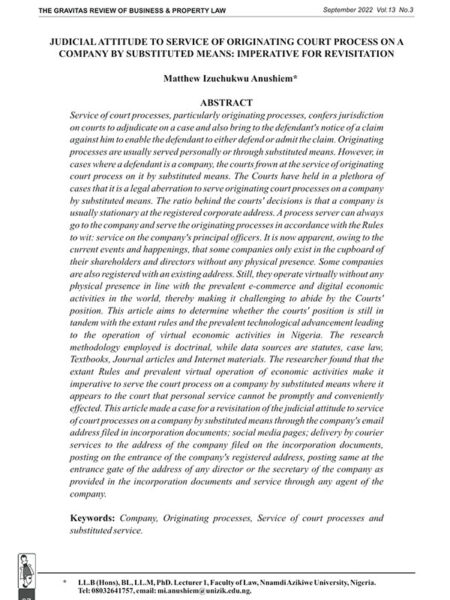
Reviews
There are no reviews yet.